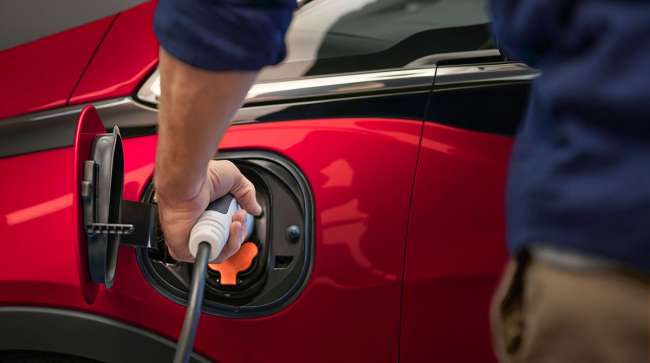Senior Reporter
Senators Propose EV Fee for Highway Trust Fund

[Stay on top of transportation news: Get TTNews in your inbox.]
Legislation to ensure electric vehicles contribute to a federal highway funding account was recently introduced in the U.S. Senate.
Sponsored by Sen. Deb Fischer (R-Neb.), the Stop EV Freeloading Act is meant to guarantee that electric vehicles support the federal Highway Trust Fund. Currently, electric vehicles, or EVs, do not contribute to the fund, which is an account backed by revenue from federal taxes on gas and diesel fuel.
“It’s not fair to force the millions of Americans who don’t drive EVs to foot the bill for those who do. Our legislation will stop EVs from freeloading and force them to pay into the Highway Trust Fund like other vehicles. If the Biden administration plans to continue pushing EVs on the American people, the least Congress can do is require EVs to support the upkeep of our nation’s infrastructure,” Fischer, a member of the Commerce Committee on freight policy, said Sept. 25.
Co-sponsoring the bill specific to EVs are Republican Sens. Pete Ricketts of Nebraska, John Cornyn of Texas and Cynthia Lummis of Wyoming.
“The Highway Trust Fund is used to pay for repairs and maintenance on federal highways and right now EVs are contributing to wear and tear on these roads without contributing to this important upkeep,” Lummis said, adding, “This administration cannot continue to favor the liberal elite and their expensive electric vehicles over the rest of American motorists; EV drivers use highways just as much as gas-powered cars. They should be forced to pay their fair share.”
“Every car that drives on our federal highways is responsible for paying into the Highway Trust Fund, and electric vehicles should be no exception,” Cornyn emphasized. “This legislation would ensure EVs pay their fair share and can’t cheat the system.”
Per background the senators provided, the bill would require EVs to contribute to the fund through a fee system. This would include a one-time fee of $1,000 on EVs at the point of sale. “If the federal government intends to continue pushing EV manufacturing and adoption, then it must also devise a strategy to ensure EVs pay their fair share for road maintenance,” according to the bill’s summary.
A committee of jurisdiction has yet to consider the legislation. A $1.2 trillion infrastructure policy law enacted in 2021 is meant to increase EVs’ presence in the marketplace.
It’s not fair to force the millions who don’t drive EVs to foot the bill for those who do.
My Stop EV Freeloading Act will ensure EVs are paying into the Highway Trust Fund to support the upkeep of our nation's infrastructure.https://t.co/VeT5Iz7JW7 — Senator Deb Fischer (@SenatorFischer) September 27, 2023
Expressing support for the measure are infrastructure stakeholders such as the American Road and Transportation Builders Association, the National League of Cities and the American Society of Civil Engineers.
“It is critically important to protect the solvency of the Highway Trust Fund as we embrace a sustainable clean energy future that includes a much greater market share of electric vehicles,” Tom Smith, ASCE’s executive director, said in a statement accompanying the bill’s introduction. “This bill provides a sensible way to ensure that all of us who use the nation’s transportation network help fund its maintenance and modernization. We look forward to working with Sen. Fischer’s office as this legislation progresses.”
“Highway and bridge users supporting the system from which they directly benefit has been the foundation of federal surface transportation investment for nearly 70 years. Sen. Fischer’s proposal is a commendable step toward restoring integrity and equity to that time-honored practice,” added David Bauer, ARTBA’s president and CEO.
Revenue from the gas and diesel tax is insufficient to meet the Highway Trust Fund’s long-term obligations. The account, used for assisting states with highway maintenance projects, is backed by the 18.4 cents-per-gallon gas tax and 24.4 cents-per-gallon diesel tax. Those tax rates were approved in 1993.
Want more news? Listen to today's daily briefing below or go here for more info:




